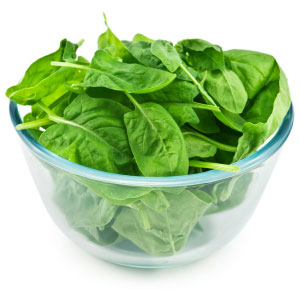
Many questions remain unanswered, however, and clinical trials are ongoing to cast light on these dark areas of vitamin K understanding.
The vitamin is traditionally less well known than vitamins A to E, but this increasing body of research, as well as increased marketing and advertising from supplement makers, is raising public awareness of vitamin K.
Different forms of vitamin K
There are two main forms of vitamin K: phylloquinone, also known as phytonadione (vitamin K1), which is found in green leafy vegetables such as lettuce, broccoli and spinach, and makes up about 90 percent of the vitamin K in a typical Western diet; and menaquinones (vitamins K2), which make up about 10 percent of Western vitamin K consumption and can be synthesised in the gut by microflora.
Menaquinones (MK-n: with the n determined by the number of prenyl side chains) can also be found in the diet. MK-4 can be found in animal meat, MK-7, MK-8, and MK-9 are found in fermented food products like cheese, and natto (a traditional Japanese food) is a rich source of MK-7.
Some sources have said that MK-4, also known as menatetrenone, is synthetic vitamin K2, which is not correct. However, MK-4 is distinct from other MKs because it isn't a major constituent of the spectrum of MKs produced by gut microflora, but can be derived from K1 in vivo.
A synthetic form of vitamin K, known as K3, does exist but is not recommended for human consumption.
Bone benefits
For the most part, research has focused on the role of vitamin K in boosting bone health. Indeed, a meta-analysis of human clinical trials using MK-4 supplements for bone health (Archives of Internal Medicine, Vol. 166, pp. 1256-1261) reported that supplements (45-milligram daily doses) resulted in reductions in hip fractures of 77 percent, vertebral fracture of 60 percent, and all non-vertebral fractures of 81 percent in elderly people.
Reports of the bone benefits for the other forms of vitamin K, most notably MK-7 from natto, can also be easily found in the literature.
A recent representative cohort study (Journal of Nutrition, Vol. 136, pp. 1323-1328) reported that postmenopausal women with a dietary intake of more than four packets of natto per week (equivalent to about 1400 micrograms of MK-7) reduced bone mass loss at the top of the thighbone (femoral neck) and in the lower arm (radius) by over 80 percent and 60 percent, respectively.
The mechanism behind the benefits is proposed to be due to vitamin K’s influence on the secondary modification of osteocalcin, a protein needed to bind calcium to the bone matrix.
Other studies have reported differing results, however, like the study from Denmark (Osteoporosis International, Vol. 17, pp. 1122-1132) that reports that vitamin K1 intake had no impact on the bone mineral density and fracture risk of peri-menopausal women.
More benefits
Research is also linking the vitamin to lower risks of atherosclerosis and cancer of the liver. The former is reported to be due to the presence of a vitamin K-dependent protein, MGP, in atherosclerotic plaque. Gene disruption of MGP is said to result in extensive calcification of the aorta.
In a recent article, published in the journal Nutrition (Vol. 22, pp. 845-852), Masao Kaneki from Harvard Medical School and his collaborators from universities in Japan, reviewed the evidence concerning atherosclerosis and cancer of the liver.
Kaneki concludes that, based on current literature, it appears possible that vitamin K deficiency is associated with atherosclerosis and hepatocarcinoma.
“The efficacy of vitamin K in the prevention and/or treatment of these diseases deserves large-scale intervention studies,” said Kaneki.
Such trials are ongoing around the world, with research reported in Europe, North America and China.
Four trials focus on the role of the vitamin in bone health, while two trials focus on coagulation. A further trial is related to these latter studies, and is looking at the potential benefits of vitamin K for dysmenorrhoea (painful menstruation).
Source: Decision News Media
Read more:




 Publications
Publications
 Partners
Partners










